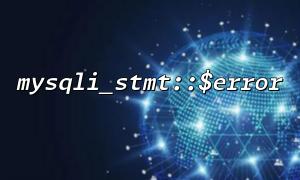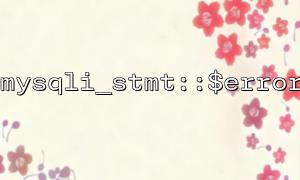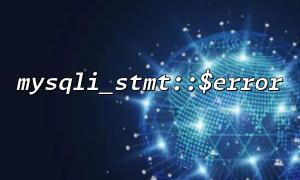In PHP, the socket_cmsg_space function is a very important tool when handling low-level network communication. It is commonly used to manage and calculate buffer space for additional data when programming with sockets . This article will explore the basic concepts, functions, and common uses of socket_cmsg_space in different application scenarios.
socket_cmsg_space is a function used to calculate the available space. It is mainly used to calculate the buffer size used to attach control information (such as out-of-band data, file descriptors, etc.) when sending data through sockets . This function helps programmers accurately reserve enough space for message control data, thereby avoiding the risk of buffer overflow or data loss.
socket_cmsg_space(int $level, int $type): int;
level : Specify the protocol level (for example: SOL_SOCKET or other protocol level).
type : Specify the control message type (for example: SO_RCVBUF , SO_RCVBUF , etc.).
This function returns an integer representing the buffer space (bytes) required for the specified message control data.
The main function of socket_cmsg_space is to calculate the space required to send control messages. Control messages are often used to pass additional information, such as:
Out-of-Band Data : refers to messages or signals that must be processed separately, usually used for high-priority communication.
File descriptor delivery : Send file descriptors through sockets , which are very common in Unix-like systems and are used to pass file handles between processes.
Priority control : Some protocols allow setting the priority of messages, socket_cmsg_space ensures that there is enough space to pass this information.
By accurately calculating the required space, developers can avoid buffer overflow or waste of resources, thereby improving program stability and efficiency.
In some specific scenarios, applications need to pass file descriptors between processes through network sockets. This operation usually uses socket_cmsg_space to ensure that the message buffer is sufficient to accommodate these file descriptors.
For example, in some Unix systems, file descriptors can be passed when using sendmsg and recvmsg functions to send and receive control messages. At this time, socket_cmsg_space plays an important role.
$socket = socket_create(AF_INET, SOCK_STREAM, SOL_TCP);
$fd = 123; // Assume this is a valid file descriptor
$control_message_space = socket_cmsg_space(SOL_SOCKET, SCM_RIGHTS);
In the above code, socket_cmsg_space returns the size of space required to pass the file descriptor.
socket_cmsg_space is also commonly used for control messages in low-level protocols. For example, in the UDP protocol, some additional headers or status information may be attached. These control messages take up extra space, and socket_cmsg_space helps developers calculate the size of this space.
Control information in network communication can greatly affect the performance of the program. Reasonable use of socket_cmsg_space can effectively manage memory, avoid unnecessary memory waste, and ensure efficient communication.
The socket_cmsg_space function plays an important role in low-level network programming, especially when it is necessary to pass control messages, file descriptors or additional information. By accurately calculating the required buffer space, programmers can ensure that data during network communication is not lost or overflowed.
Whether it is file descriptor delivery, out-of-band data processing, or other protocol-level control messages, socket_cmsg_space is a powerful tool to help developers optimize memory management and improve application stability.















